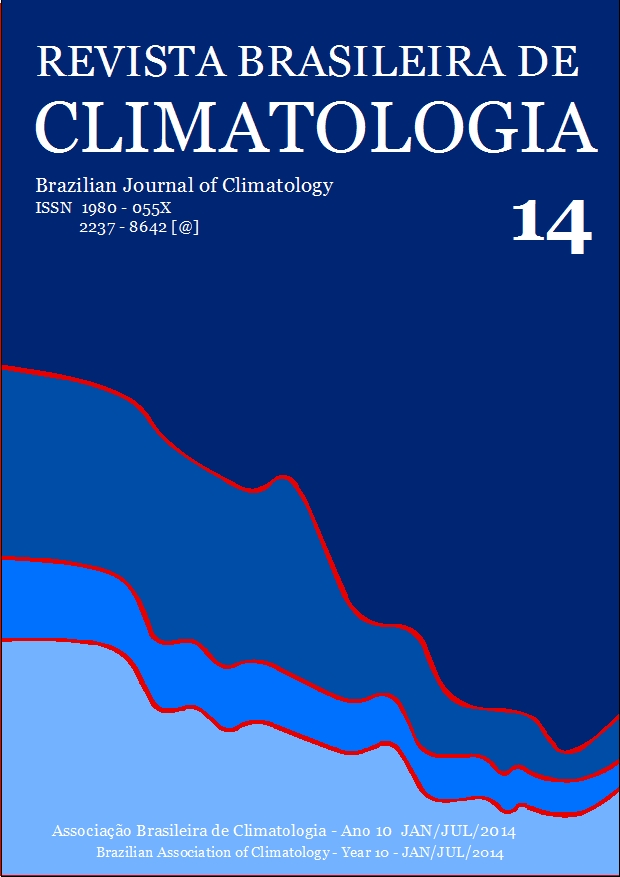CLIMATE CHANGE AND THE AVAILABILITY OF WATER RESOURCES IN BENIN
DOI:
https://doi.org/10.5380/abclima.v14i1.38169Palabras clave:
climate change scenario, water resources, water law, Benin.Resumen
It is likely that climate change in the coming decades, even very few, will produce more important impacts on thesocio-economic systems than in the past, due to the growth in world population and the increasing sophistication of technology and development issues (Issa, 1995). According to UNESCO (2006), climate change will be responsible for 20% of the worsening water scarcity in the world. This looming water crisis will be induced by changes in the parameters that determine the water cycle (Totin, 2005). The study is based on analysis of a baseline from which the main meteorological parameters (rainfall, flow, etc.) are projected to 2025 time horizon. It corresponds to the horizon of the prospective study for 2025 in Benin. From these basic parameters, the main elements to characterize water resources (such as infiltration, the volume of water available water bodies, etc.) were determined for each time horizon. Research carried out in different regions of the Benin on climate issues, surface and ground water (Gbatcho 1992; Boko, 1998; Boukari, 1998 Linsoussi, 2000; Sadji, 2004; Amoussou, 2003 and 2005; Totin, 2003 and 2005; Tossa, 2005; Vissin et al., 2006 ; Vissin, 2001 and 2007 ; Alassane and Boukari, 2007; Idiéti, 2009 ; Totin, 2009) attest ruptures occurred in hydro-climatic chronicles during the 1970s and indicate a downward trend in superficial water resource two to four folds greater than that of rainfall in key watersheds. Similarly, the aquifers record deficit on refill aquifers (Boukari, 1998; Totin, 2005) and a variation of hydro-chemical caracteristics (Alassane, 2004). If this climate and hydrological trend continues, hydrological drought will lead to a considerable reduction of water resources and a potential shortage. Similarly, the water quality will be affected in various ways. Very wet weather events would induce an increased transfer of pollutants to the water bodies as opposed to dryness that would accentuate deterioration especially of the bacteriological quality of water resources. Facing to the quantitative and qualitative degradation of both surface and groundwater should develop strategies to increase the potential availability of the resource. To this end, it is important above all to protect areas of groundwater recharge, stabilize stream banks and water bodies. Improving the quality of water resources in a changing climate context implies that people are aware of the risks of shortage and of agricultural good practices (no use of chemical fertilizers and synthetic pesticides), management of solid and liquid waste. The water law must be adapted to the context of climate change and vulnerability of the water resource.Descargas
Descargas
Publicado
Cómo citar
Número
Sección
Licencia
A aprovação dos artigos implica a aceitação imediata e sem ônus de que a Revista Brasileira de Climatologia terá exclusividade na primeira publicação do artigo. Os autores continuarão, não obstante, a deter os direitos autorais. Os autores autorizam também que seus artigos sejam disponibilizados em todos os indexadores aos quais a revista está vinculada.
Os autores mantém seus direitos de publicação sem restrições
A Comissão Editorial não se responsabiliza pelos conceitos ou afirmações expressos nos trabalhos publicados, que são de inteira responsabilidade dos autores.
A Revista Brasileira de Climatologia oferece acesso livre imediato ao seu conteúdo, seguindo o entendimento de que disponibilizar gratuitamente o conhecimento científico ao público proporciona maior democratização do conhecimento e tende a produzir maior impacto dos artigos publicados. Os artigos publicados na revista são disponibilizados segundo a Licença Creative Commons CC-BY-NC 4.0 (https://creativecommons.org/licenses/by-nc/4.0/). Segundo essa licença é permitido acessar, distribuir e reutilizar os artigos para fins não comerciais desde que citados os autores e a fonte. Ao submeter artigos à Revista Brasileira de Climatologia, os autores concordam em tornar seus textos legalmente disponíveis segundo essa licença




